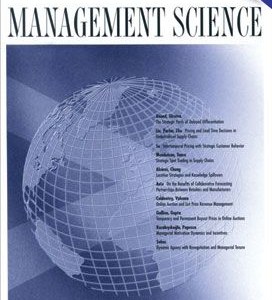
Khadjavi, M. (2017). Indirect reciprocity and charitable giving-evidence from a field experiment Management Science, 63(11):3708--3717.
-
Affiliated author
-
Publication year2017
-
JournalManagement Science
This paper investigates two channels of prosociality: indirect reciprocity and charitable giving. We conducted a natural field experiment in a hair salon in Hamburg, Germany, over the course of four months. In the baseline, we collected data on customers' tips-A scenario absent indirect reciprocity and donations. In two treatments we had the hairdresser collect donations to a charity. In one treatment the hairdresser pointed out the opportunity to donate. Our data indicate that the voluntary activity of collecting donations in the salon led to greater tips for the hairdresser and significant donations. In the second treatment, the hairdresser unconditionally donated to the charity before the customers could. This donation did not increase tips further compared with the collectiononly treatment. Our data indicate that indirect reciprocity works in the field. We find evidence that indirect reciprocity and charitable giving work as complements.